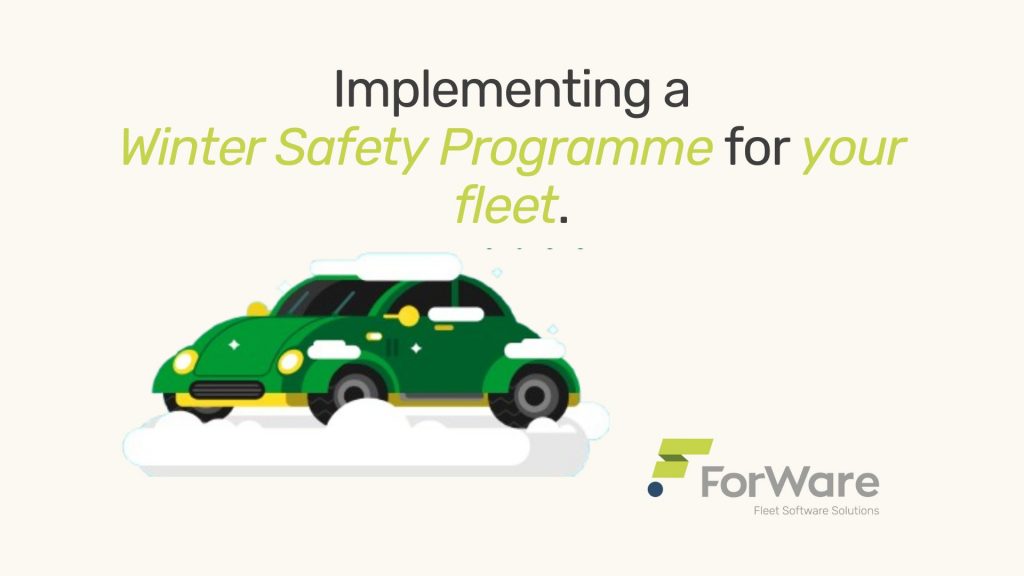Menu

December 16, 2024
As the days get colder, we all need to take extra care when driving in what are often quite poor conditions where both road surface adhesion and visibility are compromised. Automotive fleet managers have a duty to ensure that not only are their drivers mindful of winter driving hazards, but that the vehicles themselves are in the safest possible condition for operation in the colder, darker months. In this article, we shall explore some key safety areas to consider when operating an automotive fleet during winter.
When you’re sending fleets out in winter months, it’s all the more important to ensure they are in the best condition. With icy roads, you need to ensure that your vehicles’ brakes are fully functional and not worn to the point of being ineffective. Likewise, with treacherous weather conditions hindering sight and visibility, automotive fleet managers need to be confident that their fleets’ lights are operating to full performance. Wipers also need to be checked for signs of wear, as your drivers will depend on them in poor weather conditions. It should go without saying but tyres should also be checked for wear and tread depth, as driving on worn tyres in winter conditions can have disastrous consequences. All of these items, and more, are checked during a Vehicle Health Check or service, so even if your vehicles are not immediately due a service, it is no harm at all to book them for a VHC during winter months to make sure that they are operating to the safest standards possible. This will pick up any defects in wipers, brakes, lights etc. With the ForWare automotive fleet management system, instant notifications can be sent so you can approve items at the touch of a button; you can even pre-approve spends up to a certain limit if desired to save time. Many garages offer specific winter services, often including a wiper change as part of the package, so it is well worth looking into these too.
Safe driving should always be encouraged no matter what type of conditions are being encountered, but in winter it is critical that drivers are mindful of how to safely handle poor or icy road conditions. Gentle breaking and steering should be emphasised (even if it sounds like you’re repeating yourself or stating the obvious), as of course should the need to observe a safe speed. No matter how well your vehicles are maintained or equipped, inattentive or dangerous driving techniques can lead to accidents very quickly if your fleet drivers are not conscientious of how their driving style can affect braking and steering performance in poor conditions.
In most cases, your fleet can’t stop operating every time there’s a cold snap or icy conditions during the winter. However, automotive fleet managers can, and should, take precautions to mitigate risks by making sure that their drivers are equipped to safely handle problems should they occur on the road. Relatively inexpensive to put together, a winter safety kit can make the difference in getting your drivers out of a difficult situation safely. A good winter safety kit should include a torch, a hi-vis vest, ice scrapers, de-icer, jump leads, a tow rope, a warning triangle, gloves, a phone charger and of course a first aid kit. It’s fairly simple when you lay it out, but it can really help in a situation where one of your vehicle has a breakdown or gets stuck in harsh conditions.
When weather warnings are in effect, automotive fleet managers should put due consideration into the journeys that their drivers will be undertaking. If the journey is essential and can’t be put off, think about the routes your drivers will be using. Where possible, it is best to stick to motorways and primary roads rather than byways, as the former are more likely to be gritted or salted, and also better lit. We’ve already discussed the importance of vehicle checks and safety packs, but the need to check wipers, tyres etc cannot be understated when you’re sending your drivers on journeys in hazardous winter conditions.
Constant diligence and checks are key to safe fleet operation during the winter months, and we hope the above has given you some insights into steps that you can take as an automotive fleet manager to implement a winter safety programme for your fleet.

Alan Maher
Alan is a positive and proactive automotive professional with over 25 years of extensive experience in the motor trade.
Alan has been vital in developing and driving the ForWare System and implementing core workshop processes with some of the most significant state and private fleets in Ireland, the UK and Europe.
Schedule a FREE consultation today to see how we can make life easier for all involved—you, your colleagues, your customers and your fleet.
By subscribing, you’ll always be the first to know about the latest articles, freebies and special offers from ForWare. So go ahead and sign up now!